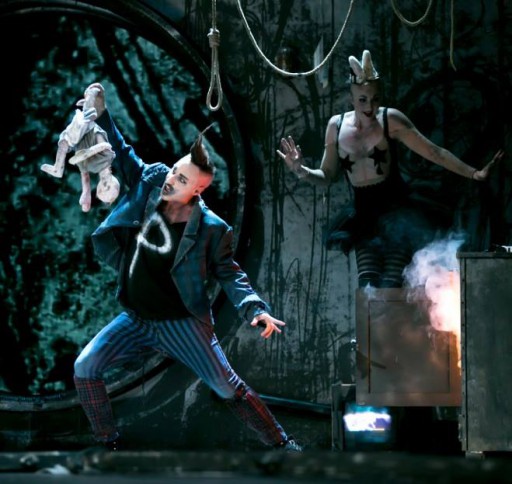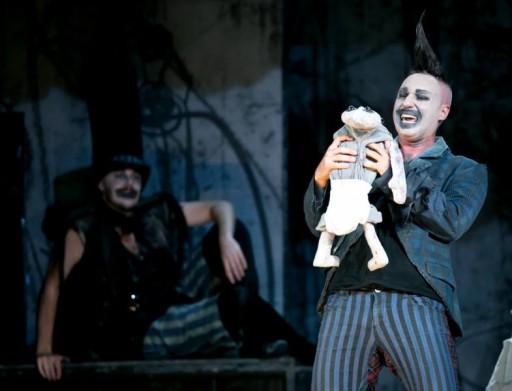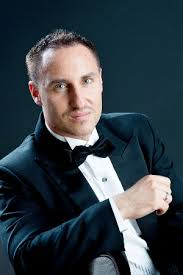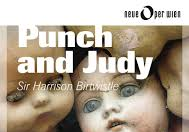 Mr. Punch (derived from the Italian character Pulcinella) and his wife Judy are puppet characters, who are popular in England and occupy a status comparable to that of the Kasperltheater genre in Austria. Typically, a hand puppeteer will present several brief sequences that usually lead to conflicts of a somewhat rough and naive nature. These usually include violence, and it was this violence in Harrison Birtwhistle’s opera Punch and Judy that sparked off heated debate in the wake of its 1968 world premiere. To this day, the opera has retained its polarizing effect.
Mr. Punch (derived from the Italian character Pulcinella) and his wife Judy are puppet characters, who are popular in England and occupy a status comparable to that of the Kasperltheater genre in Austria. Typically, a hand puppeteer will present several brief sequences that usually lead to conflicts of a somewhat rough and naive nature. These usually include violence, and it was this violence in Harrison Birtwhistle’s opera Punch and Judy that sparked off heated debate in the wake of its 1968 world premiere. To this day, the opera has retained its polarizing effect.
Just a few minutes into the action, Mr. Punch brutally murders his own child and Judy –and as the plot progresses, he ends up killing almost everyone else he encounters. He allows only Pretty Polly -whom he practically worships -/to stay alive. But eventually, Punch is overcome by horrible nightmares and the music begins to change in character…
 Paul Griffiths once wrote that Birtwistle’s Mr. Punch is the diametric opposite of Petrushka in Stravinsky’s eponymous ballet. While Petrushka is a puppet, which behaves more and more like a human being, Mr. Punch is a human being, who treats those surrounding him like puppets –carelessly, brutally, and devoid of conscience.
Paul Griffiths once wrote that Birtwistle’s Mr. Punch is the diametric opposite of Petrushka in Stravinsky’s eponymous ballet. While Petrushka is a puppet, which behaves more and more like a human being, Mr. Punch is a human being, who treats those surrounding him like puppets –carelessly, brutally, and devoid of conscience.
Harrison Birtwistle and his librettist Stephen Pruslin created a stylized tragedy full of grotesque moments. The music is as capable of portraying a monstrous being as it is of portraying love. Their work opens up a positively other-worldly realm, with insane twists and the atmosphere of the marketplace.Written commissioned by Aldeburgh Festival, the work is presented as a tragic comedy, focuses on the adventures of Punch, a mad man suffering from severe personality disorders.
 The Opera, in the production of Neue Oper Wien (Wien, Austria), in october 2014 won the great prize of the jury at the ARMEL FESTIVAL and the audience prize at ARTE LIVE TELEVISION, in Budapest.
The Opera, in the production of Neue Oper Wien (Wien, Austria), in october 2014 won the great prize of the jury at the ARMEL FESTIVAL and the audience prize at ARTE LIVE TELEVISION, in Budapest.
A tragical comedy or comical tragedy in one act. Scenario and libretto written by Stephen PRUSLIN, Director: Leonard PRINSLOO, Conductor: Walter KOBÉRA.
 Punch – Richard RITTELMANN (Hungary) Judy; Fortune teller – Manuela LEONHARTSBERGER Choregos; Jack Ketch – Till VON ORLOWSKY Pretty Polly; Witch – Jennifer YOON Lawyer – Lorin WEY Doctor – Johannes SCHWENDINGER Dancer – Evamaria MAYER
Punch – Richard RITTELMANN (Hungary) Judy; Fortune teller – Manuela LEONHARTSBERGER Choregos; Jack Ketch – Till VON ORLOWSKY Pretty Polly; Witch – Jennifer YOON Lawyer – Lorin WEY Doctor – Johannes SCHWENDINGER Dancer – Evamaria MAYER
WITH: amadeus ensemble-wien Set and costume – Monika BIEGLER Video design – Bernd PREIML Lighting design – Norbert CHMEL Language coach – Stephen CHAUNDRY Musical coach – Anna SUSHON Musical assistant – Jack RIDLEY Dramaturgy – Axel PETRI-PREIS Stage manager – Lucija DEDIC Assistant – Thomas WAHL Production manager – Su PITZEK Technical director – Norbert CHMEL Make-up artist – Henriette ZWÖLFER Assitant director – Barbara PREIS Orchestra management – Wolfgang TROJAN Stage construction – winter artservice
This Opera’s production will be performed at the theatre Opera of Avignon on june 2015.
 Richard RITTELMANN (baritone, Hungary) – Punch Richard Rittelmann debuted at the age of 22 at the Opéra National de Lyon in Doktor Faust (Busoni). Since then he has been a winner at various international competitions. His discography covers a wide repertoire, from baroque to classical, romantic, 20th-century and contemporary repertoire, including some world premieres. His most memorable roles include Harlekin in Ariadne auf Naxos (Strauss), Le Bret in Cyrano de Bergerac (Alfano), Figaro in Il barbiere di Siviglia (Rossini), Danilo in The Merry Widow (Lehár), Tarquinius in The Rape of Lucretia (Britten), and Pelléas in Pelléas et Mélisande (Debussy), for which he gained worldwide reputation…
Richard RITTELMANN (baritone, Hungary) – Punch Richard Rittelmann debuted at the age of 22 at the Opéra National de Lyon in Doktor Faust (Busoni). Since then he has been a winner at various international competitions. His discography covers a wide repertoire, from baroque to classical, romantic, 20th-century and contemporary repertoire, including some world premieres. His most memorable roles include Harlekin in Ariadne auf Naxos (Strauss), Le Bret in Cyrano de Bergerac (Alfano), Figaro in Il barbiere di Siviglia (Rossini), Danilo in The Merry Widow (Lehár), Tarquinius in The Rape of Lucretia (Britten), and Pelléas in Pelléas et Mélisande (Debussy), for which he gained worldwide reputation…
 NEUE OPER WIEN The Neue Oper Wien was founded in 1990. The company specialises in modern music theatre, with the uncompromising policy of selecting only works from the 20th and 21st centuries. New discoveries as well as world and local premieres are central to the company’s work. Its objective is to revive modern opera repertoire. The Viennese audience enthusiastic about the works of Benjamin Britten was impressed by the Neue Oper Wien, when they staged Billy Budd for the first time in Austria in 1996. The first performance of Lachenmann’s Das Mädchen mit den Schwefelhölzern was also put on stage by the Neue Oper Wien in 2003 – this production was a sensational success and drew much international attention. Lacking its own venue or a constant company, the Neue Oper Wien could remain flexible; it regularly changes the venue of its performances. It selects stages for the work to be to be performed, with the constant modification of the space, the scenery is adapted closely to the space, aiming at the best acoustic effect possible. Under the leadership of Walter Kobéra, the Neue Oper Wien has demonstrated that innovation and popular success are not mutually exclusive, and that modern opera and innovative stagings need not distract lovers of music from this genre, but rather lead to intense discussions between audience and artists. The Neue Oper Wien considers the music theatre as a laboratory of “new music,” a forum to discuss timely social issues.
NEUE OPER WIEN The Neue Oper Wien was founded in 1990. The company specialises in modern music theatre, with the uncompromising policy of selecting only works from the 20th and 21st centuries. New discoveries as well as world and local premieres are central to the company’s work. Its objective is to revive modern opera repertoire. The Viennese audience enthusiastic about the works of Benjamin Britten was impressed by the Neue Oper Wien, when they staged Billy Budd for the first time in Austria in 1996. The first performance of Lachenmann’s Das Mädchen mit den Schwefelhölzern was also put on stage by the Neue Oper Wien in 2003 – this production was a sensational success and drew much international attention. Lacking its own venue or a constant company, the Neue Oper Wien could remain flexible; it regularly changes the venue of its performances. It selects stages for the work to be to be performed, with the constant modification of the space, the scenery is adapted closely to the space, aiming at the best acoustic effect possible. Under the leadership of Walter Kobéra, the Neue Oper Wien has demonstrated that innovation and popular success are not mutually exclusive, and that modern opera and innovative stagings need not distract lovers of music from this genre, but rather lead to intense discussions between audience and artists. The Neue Oper Wien considers the music theatre as a laboratory of “new music,” a forum to discuss timely social issues.







